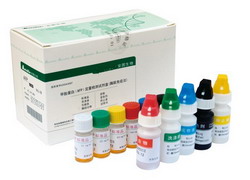Products
| In Vitro Diagnostic |
| Instruments |
| Reagents |
| Consumables |
| Laboratory Science |
| Tumor Markers |
Available kits: AFP, CEA, HCG, β-HCG, PSA, FPSA, CA-125, CA-15-3, CA-19-9, β2-MG, Ferritin
Introduction Alpha-fetoprotein (AFP) is a glycoprotein with a molecular weight of approximately 70,000 daltons. AFP is produced mainly by the fetal yolk sac and fetal liver and to a lesser extent by the fetal gastrointestinal tract and kidneys. Elevation of serum AFP to abnormally high values occurs in several malignant diseases, most notably nonseminomatous testicular cancer and primary hepatocellular carcinoma. Approximately 70% of patients with primary hepatocellular carcinoma show elevated levels of AFP. In the case of testicular teratoma a direct relationship has been observed between incidence of elevated AFP levels and the stage of disease. No increased AFP levels are found in testicular seminomas. The application of AFP measurement to the management of carcinoma patients has been well documented. In addition, elevated serum AFP concentrations have been measured in patients with other non-cancerous diseases, including ataxia telangiectasia, hereditary tyrosinemia, neonatal hyperbilirubinemia, acute viral hepatitis, chronic active hepatitis, and cirrhosis. Elevated serum AFP concentrations are also observed in pregnant women. Therefore, AFP measurements are not recommended for use as a screening procedure to detect the presence of cancer in the general population.
CEA ELISA Carcinoembroyonic antigen (CEA) is a cell-surface 200 kD glycoprotein. It was first described by Gold and Freedman in 1965 as a complex immunoreactive glycoprotein found in epithelial adenocarcinomas of the colon and fetal colon. Increased levels of CEA are observed in more than 30% of patients with cancer of the lung, liver, pancreas, breast, colon, head or neck, bladder, cervix, and prostate. Elevated plasma levels are related to the stage and extent of the disease, the degree of differentiation of the tumor, and the site of metastasis. Its main use is in the monitoring of cancer patients after surgery, chemotherapy or radiotherapy. Successful removal of the tumor is usually followed by a decrease in the concentration of circulating CEA, whereas recurrence of the primary tumor or metastasis is accompanied by increasing CEA concentrations. Elevated serum levels of CEA may be found in a variety of benign and malignant conditions other than carcinoma of the colon. Conditions that may cause elevated levels of CEA include hepatic cirrhosis, hepatitis, heavy smoking, bronchitis, pancreatitis, gastritis, inflammatory bowel disease and renal disease.
HCG ELISA Human chorionic gonadotrophin (HCG) is a glycoprotein hormone normally produced by placenta during pregnancy. The hormone is present in blood and urine around seven to thirteen days following implantation of the fertilized ovum. Structurally intact HCG molecules consist of two non-covalently linked polypeptide subunits, the alpha and beta chain subunits. Measurement of intact HCG and of the alpha subunit of HCG appears to give similar results in blood and urine but not the levels of beta subunit. HCG and the free subunits appear not to be useful as serological markers for nontrophoblastic tumors; however, the absolute increase of b-hCG level in choriocarcinoma patients clearly differentiates it from normal pregnancy. |


